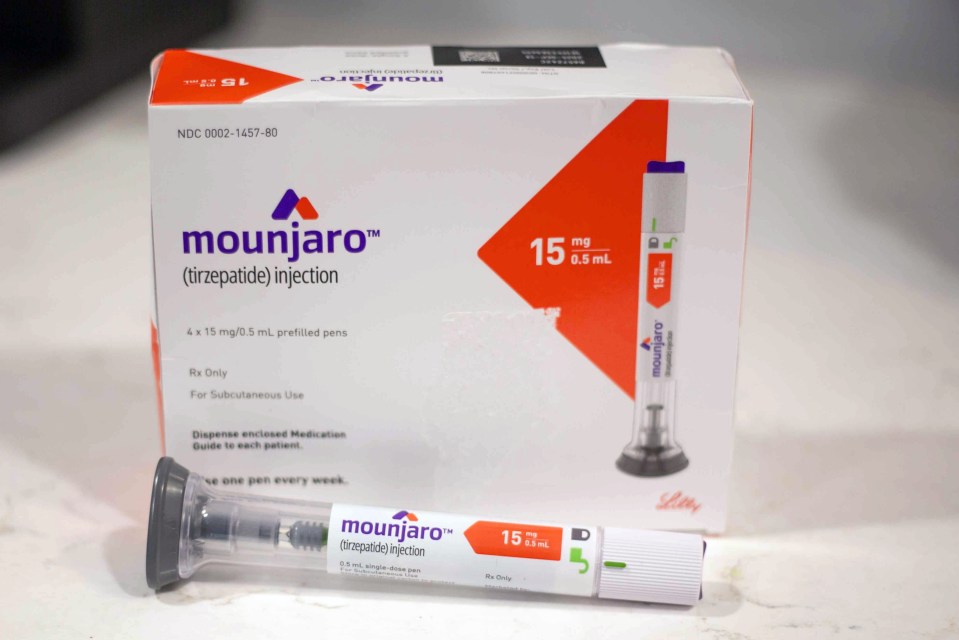A YOUNG woman has revealed that she went from a size 18 to a 10 after using fat jabs.
Bethany Diana, 27, lost six stone after using Mounjaro, but experts and NHS medics warn about the dangers of taking such medications without a prescription.
The brunette beauty who is from the UK, confirmed that she has the same swollen leg condition as Shaughna Phillips – Lipedema – but now her pins look great after losing weight.
According to the NHS, Lipedema is ‘an abnormal build-up of fat in your legs and sometimes arms which can be painful and affect daily life’.
It is a common but under-recognised disorder and may cause pain, tenderness, swelling, and easy bruising.
But despite her weight loss helping to reduce the size of Bethany’s legs, the Mounjaro, which is regarded by some as the King Kong of weight loss jabs, had a very unexpected impact on her bum.
Posting on social media, Bethany shared a clip of her exercising in the gym.
She wore a grey pair of gym leggings with a black crop top as she did an arm workout.
Bethany had someone film her exercising from behind, as she showed off her now much-flatter bum – which plastic surgeons are spotting a rise of as a result of those using injections such as Mounjaro and Ozempic.
Alongside laughing face emojis, Bethany asked: “Who else has Mounjaro a**?”
Not only this, but she also wrote: “Mounjaro stole my booty.”
Clearly in disbelief at the unexpected side effect, she penned: “Pooooof! It disappeared.”
Sun GP Dr Zoe Williams claimed that Mounjaro, which could soon be rolled out on the NHS, can save the lives of people with “life-threatening levels of obesity”.
But despite this, the NHS warned: “Never take an anti-obesity medicine if it has not been prescribed to you.
“These types of medicines may not be safe for you and can cause serious side effects.”
Bethany has been candid about her Mounjaro journey and claimed that she decided to use the injections after spending her “whole adult life wanting nothing but to be skinny”.
She was fed up of feeling “insecure” and initially topped the scales at 15 stone 12 lbs, but after less than a year, has now lost six stone.
Everything you need to know about fat jabs
Weight loss jabs are all the rage as studies and patient stories reveal they help people shed flab at almost unbelievable rates, as well as appearing to reduce the risk of serious diseases.
Wegovy – a modified version of type 2 diabetes drug Ozempic – and Mounjaro are the leading weight loss injections used in the UK.
Wegovy, real name semaglutide, has been used on the NHS for years while Mounjaro (tirzepatide) is a newer and more powerful addition to the market.
Mounjaro accounts for most private prescriptions for weight loss and is set to join Wegovy as an NHS staple this year.
How do they work?
The jabs work by suppressing your appetite, making you eat less so your body burns fat for energy instead and you lose weight.
They do this my mimicking a hormone called GLP-1, which signals to the brain when the stomach is full, so the drugs are officially called GLP-1 receptor agonists.
They slow down digestion and increase insulin production, lowering blood sugar, which is why they were first developed to treat type 2 diabetes in which patients’ sugar levels are too high.
Can I get them?
NHS prescriptions of weight loss drugs, mainly Wegovy and an older version called Saxenda (chemical name liraglutide), are controlled through specialist weight loss clinics.
Typically a patient will have to have a body mass index (BMI) of 30 or higher, classifying them as medically obese, and also have a weight-related health condition such as high blood pressure.
GPs generally do not prescribe the drugs for weight loss.
Private prescribers offer the jabs, most commonly Mounjaro, to anyone who is obese (BMI of 30+) or overweight (BMI 25-30) with a weight-related health risk.
Private pharmacies have been rapped for handing them out too easily and video calls or face-to-face appointments are now mandatory to check a patient is being truthful about their size and health.
Are there any risks?
Yes – side effects are common but most are relatively mild.
Around half of people taking the drug experience gut issues, including sickness, bloating, acid reflux, constipation and diarrhoea.
Dr Sarah Jarvis, GP and clinical consultant at patient.info, said: “One of the more uncommon side effects is severe acute pancreatitis, which is extremely painful and happens to one in 500 people.”
Other uncommon side effects include altered taste, kidney problems, allergic reactions, gallbladder problems and hypoglycemia.
Evidence has so far been inconclusive about whether the injections are damaging to patients’ mental health.
Figures obtained by The Sun show that, up to January 2025, 85 patient deaths in the UK were suspected to be linked to the medicines.
The content creator claimed that it took her six months to see any results on her legs and alongside using Mounjaro, was also calorie counting.
She suffered with “minimal” side effects and revealed that she “only started exercising after the majority of the weight had gone”.
Social media users react
The TikTok clip, which was posted under the username @bethanydianax, has clearly left many open-mouthed, as it has quickly amassed 74,100 views in just 16 hours.
Not only this, but it’s also racked up 1,026 likes, 97 comments and 1,348 shares.
Six stone down and it’s GONE… currently doing squats to get it back
TikTok user
Despite countless comments praising Bethany’s weight loss as “amazing”, numerous women flocked to the comments and admitted that they too have noticed their bum disappear after using Mounjaro.
One person said: “Me too! It slid down and now is just a line between my back and thighs. I am doing 30 squats a day but so far – nothing.”
Another added: “Yes I now currently own a flat pack back.”
What are the other side effects of weight loss jabs?
Like any medication, weight loss jabs can have side effects.
Common side effects of injections such as Ozempic include:
Nausea: This is the most commonly reported side effect, especially when first starting the medication. It often decreases over time as your body adjusts.
Vomiting: Can occur, often in conjunction with nausea.
Diarrhea: Some people experience gastrointestinal upset.
Constipation: Some individuals may also experience constipation.
Stomach pain or discomfort: Some people may experience abdominal pain or discomfort.
Reduced appetite: This is often a desired effect for people using Ozempic for weight loss.
Indigestion: Can cause a feeling of bloating or discomfort after eating.
Serious side effects can also include:
Pancreatitis: In rare cases, Ozempic may increase the risk of inflammation of the pancreas, known as pancreatitis, which can cause severe stomach pain, nausea, and vomiting.
Kidney problems: There have been reports of kidney issues, including kidney failure, though this is uncommon.
Thyroid tumors: There’s a potential increased risk of thyroid cancer, although this risk is based on animal studies. It is not confirmed in humans, but people with a history of thyroid cancer should avoid Ozempic.
Vision problems: Rapid changes in blood sugar levels may affect vision, and some people have reported blurry vision when taking Ozempic.
Hypoglycemia (low blood sugar): Especially if used with other medications like sulfonylureas or insulin.
A third commented: “Me too. It’s just a slit with skin at the bottom now.”
Not only this, but at the same time, someone else chimed in and admitted: “Same girl. Six stone down and it’s GONE… currently doing squats to get it back haha.”
Be aware of the dangers
But those debating whether to begin using Mounjaro should know that it can have fatal consequences.
Not only this, but experts and NHS medics have warned about the dangers of taking such medications without a prescription.
Mounjaro works by suppressing your appetite, making you feel fuller for longer.
The injections are licensed for patients with type 2 diabetes and are administered every seven days.
They are also available to assist those who are clinically obese (with a Body Mass Index of 30 or over).
The drugs, which have been widely regarded as ‘fat jabs’, can be prescribed by a practitioner – such as a doctor, nurse or a pharmacist-independent prescriber.
But increasingly, we are seeing more and more people buying them through online pharmacies, without sufficient checks.
Not only this, but recently, figures from the Medicines and Healthcare products Regulatory Agency revealed that fat jabs had been linked to 82 deaths across the UK.
Following the death of a man from Burton upon Trent, Staffs, who died after taking Mounjaro, his family are now calling for a probe into the jab’s “potential to kill.”
Unlock even more award-winning articles as The Sun launches brand new membership programme – Sun Club
















